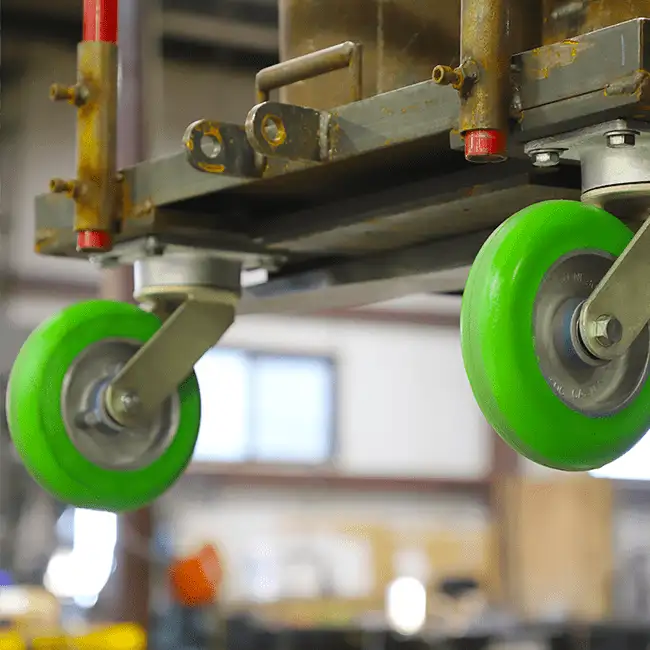

Choosing the right wheel material for an industrial caster depends on many conditions that can significantly affect its longevity and performance.
Knowing which material is appropriate for a particular environment is important because choosing the wrong one can lead to safety issues, inferior performance, or damage to the associated floors and tracks.
Here are 5 key points you should consider to help determine the best industrial caster and wheel for your application:
This is where the rubber hits the road, so it’s important to evaluate the condition of your floor and its composition. If the wheel is harder than the surface that it is running on, there will be an undesirable degradation of the floor’s surface to the point that it requires repair.
For example, a forged steel wheel may be a good consideration if the choice was only based on load capacity. However, if the surface the wheel is running on is a cement floor, the floor will not survive regular usage of a steel wheel.
• A softer material, such as polyurethane, will not cause any floor damage as it is softer than the cement.
And while a polyurethane wheel doesn’t carry as heavy as a load for a comparable size, it can be up-sized to fit the requirement.
Another situation where surface consideration is critical is a track application. It is very important that the surface of the track is slightly harder than the wheel.
This slight mismatch of wheel and track hardness will cause gradual wear of the wheel while allowing the track to have a long useful life.
If the application is a hand application, the amount of force it takes to move the cart is impacted by the wheel material.
• In general, the harder the material the easier it is to roll or swivel.
The key is matching the material of the wheel with the floor composition as covered above. If polyurethane is an acceptable material, closely evaluate the type of urethane as the composition may have a significant impact on ergonomic issues. There are a variety of custom polyurethane formulations to meet your needs.
Certainly, product longevity is an essential consideration when choosing the wheel make up.
• The tougher the material the longer the wheel will last.
First, choose the class of material that best fits your needs (steel, rubber, polyurethane, etc.) and then within that class, choose the material that fits your durability needs.
Housekeeping of the floor is another issue that impacts what wheel material is going to work the best. If there is metallic debris on the floor, a steel wheel may survive the debris but the debris will cause the material from operating smoothly.
With polyurethane wheels, poor housekeeping leads to loose material becoming embedded in the wheel while causing premature destruction of the wheel tread.
After you have taken all these considerations into account, prioritize them and decide which is most important. If the lifetime of the floor is priority one, that immediately eliminates many wheel compositions. If ergonomics is next on your list of priorities, then you need a wheel that won’t destroy your floor while providing ergonomic benefits that reduce injury and increase productivity.
• While going through this process, be sure to make a clean floor a priority to avoid the durability issues associated with excess floor debris.
Next, select the durability of the wheel material that meets the aforementioned criteria and provides the highest level of durability.
Caster Concepts engineering staff is ready, willing and able to assist in determining the wheel material that meets the criteria that are most important to your application. The proper selection of wheel material prior to putting the caster into the application will provide you with a satisfying experience and return on your investment.